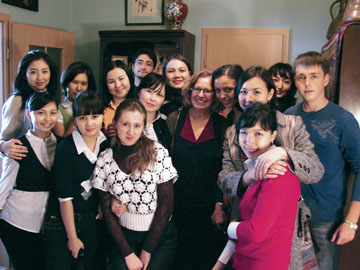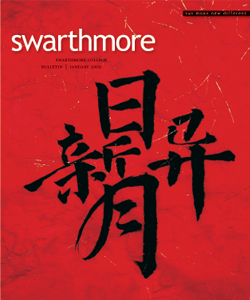Election Odyssey
Some concerns about Kazakhstan’s elections struck close to home for this American political scientist.

Nackenoff (center, with glasses) and some of the students she discussed the American elections with during her State Department–sponsored lecture tour in Kazakhstan.
On October 9, I left the United States on a remarkable journey. Just three weeks earlier, Natasha Franceschi ’96 had e-mailed Swarthmore’s Political Science Department, asking if we had a faculty member who could speak about the upcoming United States presidential election—in Kazakhstan. Natasha, who had taken my American Politics class in fall 1992 (the first semester at Swarthmore for both of us), is cultural affairs officer in the U.S. Embassy in Astana. Associate Professor of Political Science Keith Reeves ’88 and I were co-teaching the American Elections class, but I was the one who could get away during fall break. The expedition confounded any preconceived notions I may have had about this huge Central Asian country. I returned profoundly impressed by the people I met and the future I believe they have as a nation.
Kazakhstan, the ninth largest country in the world (about the size of all Western Europe) is a peaceful nation noted for religious tolerance. About half the population is Muslim and half Russian Orthodox.
I visited four cities, flew over miles of flat, agricultural land, and saw varied and rich produce in colorful markets. Almaty, the former capital—once known as Alma-Ata or “father of apples”—was my first stop. Situated close to the border with Kyrgyzstan, Almaty has a mild climate compared to more northerly cities and is European in character.
Astana, my second stop, is the glittering new capital city, selected for its more central location. It has been transformed from a sleepy mid-sized city to a rather fanciful seat of government. (The presidential palace might be described as the White House on steroids, with a blue dome on top.) Astana is expected to become the home of more than a million people, but construction cranes are, sadly, motionless, brought to a standstill by the global financial crisis.
From Astana, I traveled southeast over good roads to Karaganda, a coal mining area that was home to gulags under Stalin. Labor camps provided workers for the mines and for building much of the city, but I was told about another aspect of the region’s camps. Dissident writers, artists, and musicians were sent to camps in this region, and many stayed in the area, giving Karaganda a rich cultural life. I also flew to Costanai, a charming northern city not far from the Russian border, where I was treated to a performance of music and dance before my first talk.
Kazakhstan was the last breakaway republic to declare its independence after the fall of the Soviet Union, becoming the Republic of Kazakhstan in 1991. It was interesting to see how deeply invested young people are in the independent states of the former Soviet Union, including Georgia and Ukraine, but also in Russia itself. They asked many questions about the U.S. presidential candidates’ stances on the Russia-Georgia conflict. Their information generally came from Russian media and their sympathies tended in Moscow’s direction.
Although Kazakhs may have been the last to leave the Soviet fold, they were among the first to stage a mass protest against Russia. In 1986, 30,000 Kazakhs took to the streets to protest Russia’s appointment of an outsider as the Communist Party leader. The Soviets reacted with force, and Kazakhs claim there were a number of deaths and many injuries.
Nursultan Nazarbaev became first secretary of the party in 1989 and has ruled ever since, now as the elected president. Nazarbaev remains a largely popular leader. I would not be surprised if Astana—which simply means “capital”—were renamed after Nazarbaev at some point in the future, since it was his project and vision.
Kazakhstan is friendly toward the United States and continues to rotate troops into Iraq as part of the coalition force. Kazakhstan is also of great interest to both the United States and Russia because of its vast oil reserves in the western region, near the Caspian Sea. The country is expected to produce 2.5 to 3.5 million barrels of oil a day by 2015. Chevron and Mobil are among the American oil companies that have invested heavily in developing the country’s energy resources.
Piping oil out of Kazakhstan—and to whom—are major international political issues. Kazakhstan also has large reserves of natural gas and is beginning to become a net exporter. Many Kazakh students studying English aspire to “go west” as translators in the booming oil and natural gas industries.
Before arriving, I read a recent Freedom House “Progress Report” on Kazakhstan’s efforts to respond to international criticisms concerning free and fair elections. I wanted some idea of what might be on the minds of students, journalists, and others as we thought about comparative perspectives on American and Kazakh elections. Many middle-class Kazakhs appreciate their nation’s strong economic growth but want more genuine democracy. Kazakhstan is slated to take over the chairmanship of the Organization for Security and Co-operation in Europe [OSCE] during 2010. Criticism of Kazakhstan’s elections by the OSCE Office of Democratic Institutions and Human Rights—and by the United States—has centered on transparency and accountability, but a Kazakh working group to reform electoral legislation has produced no concrete results.
One OSCE goal is to end electronic voting because it does not provide sufficient transparency and accountability. Foreign observers—and many Kazakhs—believe that recent election returns in Kazakhstan have been manipulated. Another measure of transparency demanded is access to voter lists so that they can be verified. International criticism has also focused on protocols for vote counting. The OSCE wants Kazakh electoral processes to be monitored by international observers and a new electoral commission in which all political forces can participate. The OSCE is also concerned about freedom of the media to report and criticize and about barriers placed in the way of opposition parties seeking to organize and participate in elections.
Some of the concerns about Kazakhstan’s elections struck close to home for this political scientist. Transparency and accountability of new voting technologies, proprietary rights to source codes for voting machines, and similar issues are concerns for Americans, especially in the aftermath of the presidential election in 2000. I had placed on reserve for both of my fall classes (American Politics and American Elections) the documentary film Hacking Democracy, a look at how easy it was for someone to alter the output of voting machines without the knowledge of poll workers so that a vote for one candidate would actually be recorded as a vote for a different candidate. Students of American politics are also aware that registration rules, practices for voting roll purges, and maintenance of voting lists are so decentralized in the United States that eligible citizens are often turned away from the polls.
Although some Kazakhs thought American elections were ideal, I felt obliged to point out a few of these issues we struggle with. One question I got from a student in Costanai concerned what international observers say about American elections. I did not know at the time that, in 2004, OSCE observers in Florida had said that they had less access to the polls than in Kazakhstan.
I gave two or three talks a day, speaking with graduate and undergraduate students studying law, international relations, foreign languages, and journalism. I was impressed with the number of fine schools I visited and their inquisitive, smart students. I also gave a talk and had a lively discussion with seasoned print journalists in Almaty. (We used a translator for all but a few audiences.)
One of the most memorable sessions was the first, held in a basement that served as headquarters for Sunday afternoon meetings of a society of young professional leaders of NGOs. These young men and women, some of whom had staged a protest and gone to jail for greater freedom to organize opposition political parties, knew a good deal about American politics and wanted to hear about the role of our political parties.
The embassy in Astana had taped the third U.S. presidential debate and brought some of the best English-speaking students to watch and discuss this debate with me. On another evening, we watched and discussed the film The Candidate. Some Kazakh students wanted to talk about the media’s role in American elections. Others believed that the financial crisis was engineered for electoral effect—a position against which I argued vigorously. I fielded many interesting questions and explained the Electoral College system to those who were not already familiar with it. I think some students were intrigued that the State Department could bring in a speaker who was willing and able to voice disagreement with the current administration on a variety of issues. Almost all of them favored Barack Obama but believed he could not be elected because of America’s history of racism. I hope they will think somewhat differently about us as a result of what happened on November 4.
 Email This Page
Email This Page